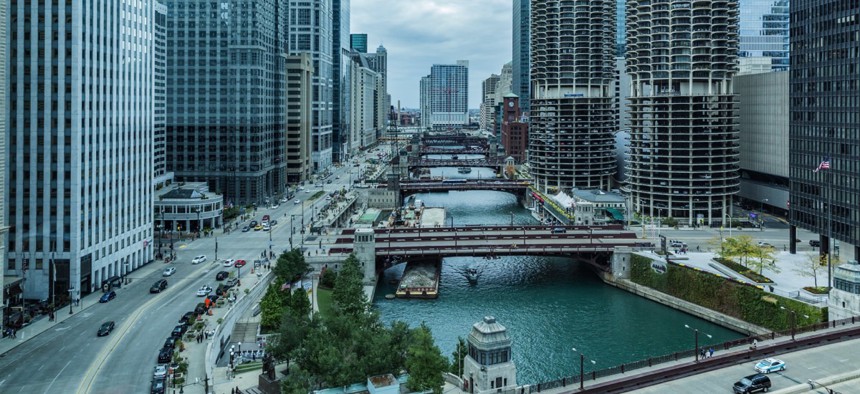Chicago’s Parking Garages Are Ready for AVs


Connecting state and local government leaders
“There can’t be an autonomous future without autonomous parking,” said SpotHero CEO Mark Lawrence.
More than 500 Chicago parking facilities can seamlessly process autonomous vehicles as of Tuesday, according to SpotHero.
The Chicago-based parking reservation service outfitted the garages and lots with license plate recognition and sensor technologies allowing driverless cars to book, pay, enter and exit the facilities on their own.
SpotHero credits people returning to live in cities and congestion caused by the “unfettered explosion” of ride hailing with the need for better parking infrastructure.
About 30 percent of traffic is caused by drivers searching for a parking spot, said CEO Mark Lawrence, and ride-hailing vehicles—cruising around empty waiting for their next fare—exacerbate the problem while wearing down streets. Connected parking facilities are meant to address both problems simultaneously, by getting future self-driving vehicles off roadways until they’re needed.
“There can’t be an autonomous future without autonomous parking,” Lawrence told Route Fifty. “Municipalities own parking garages, and they want to work with us so we can drive better utilization.”
Lawrence worked with aldermen in Chicago’s West Loop and Lincoln Park neighborhoods to identify unused parking spaces owned by local businesses that could be booked using the SpotHero app.
The company works with about 5,000 connected parking facilities across more than 50 metro areas including New York City and Lexington, Kentucky.
Lexington was one of the first cities to digitize its parking infrastructure shortly after installing a parking access revenue control system, where you press a button and a parking ticket comes out admitting you into the garage. The Lexington & Fayette County Parking Authority began displaying space counts outside the four garages, totaling 2,200 spaces, in its LEXPARK program.
As Lexington rolls out Spothero’s parking reservation system—although not the one that can coordinate with self-driving cars—AVs are in the back of everyone’s minds, said Gary Means, the authority’s executive director.
Means feels the city is on the brink of allowing AVs to purchase blocks of time at garages at any time of day.
“This is preparation for when, even if it’s not autonomous, connected cars can be communicating,” Means said.
A connected car could GPS to the local Opera House and show the different rates for parking one or two blocks away, allowing the driver to choose a garage from the dash. Once a space is reserved, Bluetooth communication would open the gate upon arrival, Means said.
With AVs, a LEXPARK account might be set up ahead of time.
Reservations through the new system will be available in a few days, Means said. While he expects AVs to make an impact on large metropolitan areas in three to four years, it could take a decade to feel the effects in Lexington.
But he noted that right now drivers want frictionless payments—the kind of customer experience they get at a place like Starbucks. This is especially true during the October to March event season in Lexington, which is centered around University of Kentucky basketball.
“I like to kid around and say in Kentucky, we’re Middle America,” Means said. “Everything gets here last.”
Dave Nyczepir is a News Editor at Government Executive’s Route Fifty and is based in Washington, D.C.

NEXT STORY: Energy launches tech transfer portal





